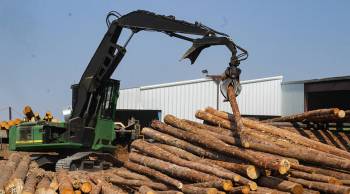Pine Beetle timber boom could soon bust
When you hear the word “boom” in the West, you usually think of the energy industry, but in the last 15 years, a timber boom has taken over.
Thanks to the mountain pine beetle, a tiny ravenous bug that’s now chomped its way through over 40 million acres of forest in the U.S., forest managers have turned to the timber industry to clean up all that dead wood, leading to a surge in jobs and enterprise.
But now, the bugs have almost eaten up all the host trees. And that raises the question, what’s next for the industry?
Hank Lucido looks just like a lumberjack out of a fairy tale with the big burly beard, the stocking cap and the boisterous laugh. Today, the company he manages, West Range Reclamations, is harvesting beetle-killed ponderosa pines on the Colorado-Wyoming border. He gives a holler and a log loader’s giant metal claw starts grabbing up several logs at a time and stacking them on a logging truck to ship for processing — even smaller branches and rotting logs.
“With a lot of our byproduct, we grind it up and we make the colored bark mulch. Then there are other places, such as dairies and horse barns that like to have wood shavings. We sell that product too,” Lucido says.
Lucido’s company also supplies wood for products never before manufactured in the region, like pellets for heating stoves and biofuel for the energy grid. Timber industry jobs in Wyoming have increased by 25 percent in the last 10 years, but Lucido says all this work could soon come to an end. That’s because the quality of the wood available to the industry is deteriorating, fast. The pine beetle has killed all its best host trees and what’s left is rotting from the inside out.
Standing next to a pile of wood, Lucido jabs his finger into the pulpy center of one log.
“Some of this, when it gets this red rot to it, if you were to grind that, it would turn to dust. When you go to grab it and it crumbles, it’s not worth anything to us.”
And it’s not worth anything to other businesses that depend on the lumber from pines, either, like Rich Arbour’s. He manufactures rustic furniture and sells it in his store, Mountain Woods in Laramie, Wyoming. He used to sell lots of dining tables and bunk beds made from blue stain, a unique-looking wood made from beetle-killed trees.
But now?
“We only have one, and it’s a particularly nice piece, and that’s this entertainment center here.”
He points at the streaks of reds and blues on the cabinet’s door.
“The beetles have infected the wood,” Arbour says, “the tree is trying to preserve itself, and it’s emitting enzymes. And the enzymes are what makes that color in the wood. It makes for pretty woods.”
He says when the pine beetle was a big deal in the news, people couldn’t get enough of blue stain furniture. But with the epidemic on the decline, he says, “The interest in it has waned, in a big way.”
It will likely continue to wane as the forest turns green again. And timber manager Mark Westfahl says the U.S. Forest Service will likely manage that next generation of young trees with a tight fist until they’re mature enough to harvest.
“How long will we be offering traditional timber sales?” Westfahl asks. “That’s kind of to be seen. It really depends on how long the trees continue to stand.”
Westfahl is the guy issuing the Forest Service contracts to loggers like Hank Lucido, but with fewer and fewer trees left, Westfahl says they’ll have to start weighing the health of the timber industry against the health of the forest.
Logger Lucido says that means the timber industry is running out of time to harvest what’s left.
“If we don’t get into this wood in the next five years, it’s going be blown over or burned up. And once it falls onto the ground, it’s done,” says Lucido.
But he says, when the pine beetle boom is over, he trusts the timber industry will still have a role to play, managing a healthier forest less prone to such epidemics in the future.
There’s a lot happening in the world. Through it all, Marketplace is here for you.
You rely on Marketplace to break down the world’s events and tell you how it affects you in a fact-based, approachable way. We rely on your financial support to keep making that possible.
Your donation today powers the independent journalism that you rely on. For just $5/month, you can help sustain Marketplace so we can keep reporting on the things that matter to you.


















